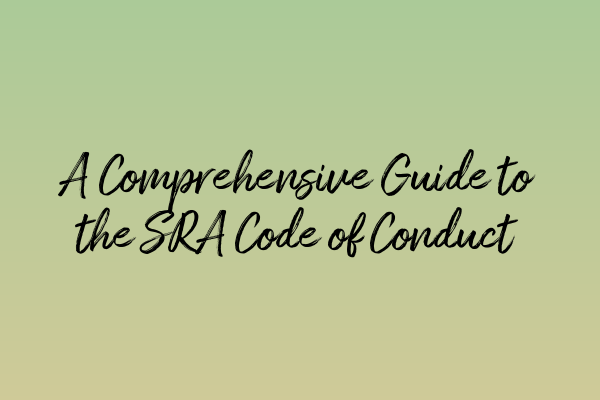A Comprehensive Guide to the SRA Code of Conduct
Welcome to our comprehensive guide to the Solicitors Regulation Authority (SRA) Code of Conduct. As a solicitor, it is crucial to understand and adhere to the rules and regulations set forth by the SRA. This guide will provide you with an in-depth overview of the SRA Code of Conduct and its importance in maintaining professional standards.
What is the SRA Code of Conduct?
The SRA Code of Conduct is a set of rules and principles that all solicitors in England and Wales must follow. It sets out the standards of professionalism and ethical behavior expected of solicitors, ensuring that clients receive high-quality legal services. The Code of Conduct is designed to protect the interests of clients, the public, and the rule of law.
Key Principles
The Code of Conduct is based on a set of key principles that guide solicitors’ behavior. These principles include:
- Honesty and Integrity
- Independence
- Duty of Confidentiality
- Equality and Diversity
- Acting in the Best Interests of Clients
These principles are the foundation of the Code of Conduct and serve as a guide for solicitors in their day-to-day practice.
Understanding the Outcomes
The Code of Conduct is divided into various outcomes, each outlining the specific behavior and actions expected of solicitors. These outcomes cover a wide range of areas, including client care, professional competence, and financial management.
For example, Outcome 1.1 states that solicitors must provide a proper standard of service to their clients. This includes communicating with clients in a way they can understand, providing clear and accurate advice, and acting in the best interests of the client.
Similarly, Outcome 2.1 requires solicitors to maintain their competence and legal knowledge. This means staying up to date with changes in the law, attending relevant training courses, and seeking appropriate advice when necessary.
Meeting the Indicative Behaviors
Each outcome is further supported by a set of indicative behaviors. These behaviors provide solicitors with specific examples of how they can comply with the outcomes. It is important to familiarize yourself with these indicative behaviors to ensure you are meeting the requirements of the Code of Conduct.
For instance, Indicative Behavior 1.6 suggests that solicitors should explain their fees and billing arrangements to clients in a clear and transparent manner. This helps to ensure that clients are fully aware of the costs involved in their legal matter.
Indicative Behavior 2.3, on the other hand, encourages solicitors to reflect on their learning and development needs and take steps to address any gaps in their knowledge or skillset.
Consequences of Non-Compliance
Failure to comply with the SRA Code of Conduct can have serious consequences for solicitors. The SRA has the power to investigate complaints and take disciplinary action against solicitors who breach the Code. This can include fines, suspension, or even striking a solicitor off the roll.
It is essential for solicitors to familiarize themselves with the Code of Conduct and take steps to ensure compliance to protect their professional reputation and maintain the trust of clients.
To delve deeper into specific areas of criminal practice, we recommend reading the following related articles:
- Private Prosecutions: Exploring Non-Governmental Prosecutions in Criminal Cases
- Rights of the Accused: Protecting Individual Liberties in Criminal Proceedings
- Magistrates’ Court vs Crown Court: Understanding Key Differences
- Protecting Vulnerable Witnesses in Criminal Trials: Best Practices and Legal Safeguards
- Unraveling the Complexities of UK Bail Laws
By reading these articles, you can gain a deeper understanding of various aspects of criminal practice and stay informed about recent developments in the legal field.
Remember, as a solicitor, it is your professional duty to uphold the highest standards of ethical conduct and provide the best possible legal services to your clients. Familiarizing yourself with the SRA Code of Conduct and staying updated on relevant legal topics will help you fulfill this duty effectively.


Leave a Reply